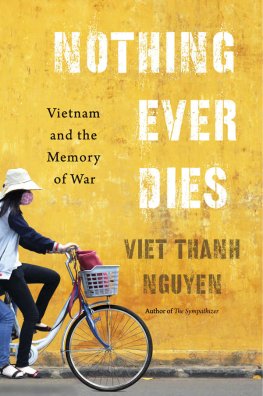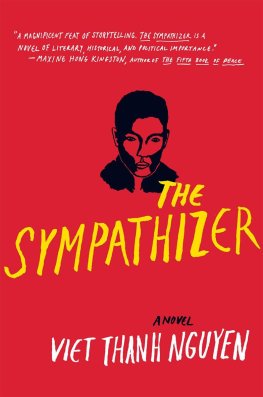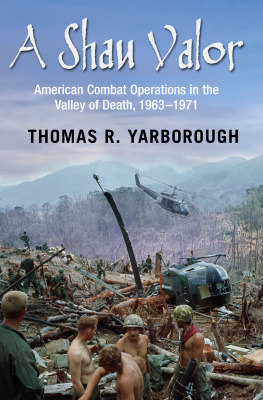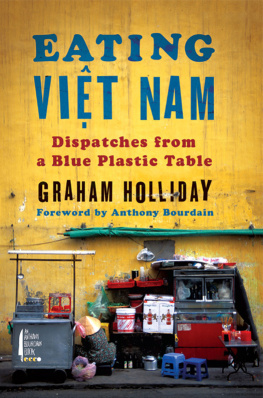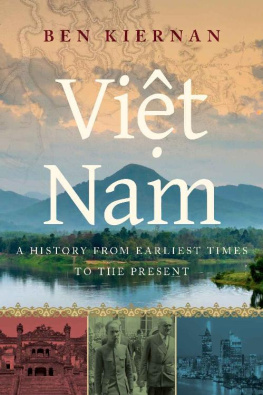MODERN SOUTHEAST ASIA SERIES
Stephen F. Maxner, General Editor
Also in the series
After the Killing Fields: Lessons from the Cambodian Genocide , by Craig Etcheson
An Loc: The Unfinished War , by General Tran Van Nhut with Christian L. Arevian
The Battle of Ngok Tavak: Allied Valor and Defeat in Vietnam , by Bruce Davies
Charlie One Five: A Marine Companys Vietnam War , by Nicholas Warr
David and Lee Roy: A Vietnam Story , by David L. Nelson and Randolph B. Schiffer
Fragging: Why U.S. Soldiers Assaulted Their Officers in Vietnam , by George Lepre
Hogs Exit: Jerry Daniels, the Hmong, and the CIA , by Gayle L. Morrison
The Mayaguez Incident: Testing Americas Resolve in the Post-Vietnam Era , by Robert J. Mahoney
Military Medicine to Win Hearts and Minds: Aid to Civilians in the Vietnam War , by Robert J. Wilensky
Operation Passage to Freedom: The United States Navy in Vietnam, 19541955 , by Ronald B. Frankum, Jr.
Vietnam and Beyond: A Diplomats Cold War Education , by Robert Hopkins Miller
Vietnam Chronicles: The Abrams Tapes, 19681972 , transcribed and edited by Lewis Sorley
Vietnam Labyrinth: Allies, Enemies, and Why the U.S. Lost the War , by Tran Ngoc Chau with Ken Fermoyle
The Vietnam War: An Assessment by South Vietnams Generals , edited by Lewis Sorley
Window on a War: An Anthropologist in the Vietnam Conflict , by Gerald C. Hickey
UPHILL BATTLE
Reflections on Viet Nam Counterinsurgency
Frank Scotton
Texas Tech University Press
Copyright 2014 by Frank Scotton
Unless otherwise credited, all photographs courtesy Frank Scotton.
All rights reserved. No portion of this book may be reproduced in any form or by any means, including electronic storage and retrieval systems, except by explicit prior written permission of the publisher. Brief passages excerpted for review and critical purposes are excepted.
This book is typeset in Minion Pro. The paper used in this book meets the minimum requirements of ANSI/NISO Z39.48-1992 (R1997).

Designed by Kasey McBeath
Cover designed by David Deal
Library of Congress Cataloging-in-Publication Data
Scotton, Frank, author.
Uphill battle : reflections on Viet Nam counterinsurgency / Frank Scotton.
pages cm (Modern Southeast Asia series)
Includes bibliographical references and index.
ISBN 978-0-89672-869-1 (hardcover : alk. paper) ISBN 978-0-89672-867-7 (pbk. : alk. paper) ISBN 978-0-89672-868-4 (e-book) 1. Vietnam War, 1961-1975Personal narratives, American. 2. CounterinsurgencyVietnam. I. Title. II. Series: Modern Southeast Asia series.
DS559.5.S395 2014
959.704'34dc23 2014003526
14 15 16 17 18 19 20 21 22 / 9 8 7 6 5 4 3 2 1
Texas Tech University Press
Box 41037 | Lubbock, Texas 79409-1037 USA
800.832.4042 | ttup@ttu.edu | www.ttupress.org
Contents
17: Elections, Governance, and the 1972 PAVN
Offensive
The Last Chapter: Deterioration and Collapse
of the Second Republic
Illustrations
Following page 242
Capt. Howard Walters and Le Quang Tuyen, October 1962.
Briefing in Qui Nhon, January 1963.
With Self Defense Corps troops, An Lao Valley, April 1963.
With rangers at an overrun outpost, Long An province, March 1964.
Do Minh Nhat briefs General Westmoreland, January 1965.
Talking with Hoc Mon district Special Platoon commander, March 1965.
In Thu Thua district, Long An province, May 1965.
With Capt. Phil Werbiski ( left ) and Capt. Art Bair, August 1965.
Bob Kelly, Quang Nam province, October 1965.
With Maj. Nguyen Be, northern Tuy Phuoc, October 1965.
With cadre in Qui Nhon, February 1966.
Maj. Nguyen Be and CIDG unit in training, March 1966.
With team leader Phai, Tuy Phuoc district, March 1966.
With Tran Huu Tri, Binh Dinh province, April 1966.
With Jerry Dodson and John Lybrand, Long Huu Island, April 1967.
With Lt. Col. Le Minh Dao, July 1969.
With Daryll Johnson and John Vann, Sadec, July 1969.
Isolated ARVN Fire Support Base 5, southwest of Dak To, June 1971.
With ARVN 1st Division soldier near Hue, June 1972.
Preface
Acclivity is ascending terrain. On maps the proximity of topographical lines indicates relative steepness. For the United States of America, and especially for us serving in Viet Nam from 1960 through 1975, the conflict had a certain uphill battle aspect throughout the war. Struggling through the early advisory period, we thought well-intentioned Americans deploying resources could tutor counterpart Vietnamese to a level of competence that would match the competition. Disappointment at our failure to reach the summit argued for increasing numbers of advisors. When that did not work as anticipated, then introduction of regular combat units was thought (by some) to be what might carry American policy to the crest. However, the mountain was so precipitous that increasing the number of deployed units never fully satisfied MACVs expressed need.
Our notional strategy was so flawed as to be incomprehensible in retrospect. Americans spoke of the war and the other war, while the Viet Nam Communist Party conducted one war. Attrition worked both ways. When America began falling back, political will exhausted, from commitment in Viet Nam, some officials hoped that a pacification regimen supporting an authoritarian regime might still secure what foreign advisors and brigades had failed to obtain. But ARVN could not fill the space vacated by foreign divisions on the game board, and the American pacification structure and practice were unsuccessful grafts on the Republic of Viet Nam. Perpetuating the war was expedient for some politicians in America but tragic in consequence for those who bore the burden. Failure of the illusion that pacification could substitute for political dynamic in the Republic of Viet Nam was made obvious by rapid erosion and collapse in 1975.
I was an ordinary young man with an opportunity to serve in an extraordinary, challenging environment. I was counseled and encouraged by an uncommon
supervisor who overlooked my raw ignorance and encouraged me to seek knowledge and share risk with Vietnamese friends. Ev Bumgardner provided guidance, unmistakably, but allowed me flexibility in carrying out directions. My account is also in part his story. He was a sponsor while introducing me to others, especially John Vann and Howard Walters, in 1962. Other elder brothers who extended friendship were Jack Gibney, Robert Kelly, John Bennett, and Bob Montague.
Vietnamese friendsNguyen Be, Nguyen Duy Be, Ha Thuc Can, Tran Ngoc Chau, Jusiu, Nay Luette, Phan Manh Luong, Do Minh Nhat, Tran Van Phien, Touneh Ton, Tran Huu Tri, Nguyen Tuy, Nguyen thi Kim Vui, and many othersshared adventures and insights into the history and sociology of their country. Vietnamese in hamlets, local militia units, province and district towns, churches, and pagodas and even prisoners were approachable and shared thoughts about their country. Some government ministers and senior military officers were also responsive. I think that was because of my trying to speak their language, even when I didnt speak it well; showing trust by keeping conversations private; and never insulting them by suggesting payment for information or that our relationship would be exploited for my benefit. When I thought a conversation drew information of immediate interest to the US mission, I would ask permission to report what was shared. Often a discussant would prefer that the information or opinion remain private, and I would honor that preference but find another way to weave it, unattributed, into discussion with other Americans.


